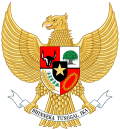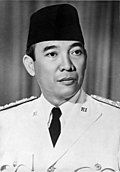President of Indonesia
The President of the Indonesia Republic is the head of state of Indonesia. The current President is Prabowo Subianto.
| President of the Republic of Indonesia | |
|---|---|
 | |
| Style | Mr./Madam President (Bapak/Ibu Presiden) (informal) His/Her Excellency (international correspondence) |
| Appointer | Elections in Indonesia |
| Term length | Five years, renewable once (amended constitution) |
| Inaugural holder | Sukarno |
| Formation | 1945 |
| Website | English site: [1] Indonesian site: [2] |
Presidents
Independent<span style="border:1px solid #AAAAAA; background-color:Lua error in package.lua at line 80: module 'Module:Political party/G' not found.; color:Lua error in package.lua at line 80: module 'Module:Political party/G' not found."> Golkar<span style="border:1px solid #AAAAAA; background-color:Lua error in package.lua at line 80: module 'Module:Political party/N' not found.; color:Lua error in package.lua at line 80: module 'Module:Political party/N' not found."> National Awakening Party Indonesian Democratic Party of Struggle<span style="border:1px solid #AAAAAA; background-color:Lua error in package.lua at line 80: module 'Module:Political party/U' not found.; color:Lua error in package.lua at line 80: module 'Module:Political party/U' not found."> United Development Party Democratic Party<span style="border:1px solid #AAAAAA; background-color:Lua error in package.lua at line 80: module 'Module:Political party/G' not found.; color:Lua error in package.lua at line 80: module 'Module:Political party/G' not found."> Great Indonesia Movement Party
President Of Indonesia Media
NotesReferences
|
||||||||||||||||||||||||||||||||||||||||||||||||||||||||||||||||||||||||||||||||||||||||||||||||||||||||||||||||||||||||||||||||||||||||||||||||||||||||||||||||||||||||||||||||||||||||||||||||||||||||

